Want to grab the attention of the best candidates? Attracting top candidates (and convincing them to apply for your open positions) starts with accurate, creative job descriptions.
Just ask the more than half of job seekers who say the quality of a job description influences their decision to apply. Or think about the potential candidates who spend just 49.7 seconds skimming a job description before deciding whether it’s a good match.
An effective job description is a big part of what attracts the right candidates to your business these days, as it provides them with what they want to know and paints a picture of the day-to-day experience in the role and your organization.
If you think your job description templates and ads could use some TLC, take a look at these creative job description examples to set you on the right track.
TL;DR — Key Takeaways
- How do you write a good job description? Let candidates know what you expect from them, such as their skills and responsibilities, and what they’ll receive in return, such as the salary range and other benefits.
- What do they want to know before applying? They’ll look for info on your company culture, work flexibility, and leadership, for instance.
- Reviewing great job description examples can help you craft more compelling posts that are short and simple and speak to candidates directly to boost their chances of applying.
- Once you’ve got qualified candidates hooked, assess their true skills and capabilities with Toggl Hire’s role-specific skills tests. And quickly pick out the best-fit candidates for the role.

How to write a great job description
Filling any open role usually starts with creating a job description and sharing it with potential candidates via a job posting. Depending on the role and how urgent the need to fill it is, hiring teams might find a creative job description online to copy, paste, and post.
However, most good job description examples we see are personalized to each role and company. They outline what skills, experience, and qualifications you’re looking for, the duties the successful candidate will be responsible for, and other core components like the role’s salary and benefits.
A great job description grabs the attention of qualified candidates to the degree that matches what the applicant is looking for.
To increase your application rate and quality, aim for clear, scannable job descriptions that share a basic understanding of what candidates want to know.
For instance, including the salary today for most roles is a must, and listing the benefits and perks can help you attract higher quality candidates who know what they deserve out of a role.
| Good | Better | Great |
| Brief summary of the role | A clear and concise overview of the role | Clear and concise overview of the role, including a detailed summary |
| Lists most responsibilities | Lists all the main responsibilities | Includes information about the company and its mission, including its diversity and inclusivity statement |
| Includes the required qualifications | Includes required as well as desired experience and qualifications | Details all the main responsibilities, as well as travel and office requirements |
| Some information about the salary and benefits package | Includes required as well as desired experience and qualifications | |
| Includes relevant links to social media, careers page, and careers help | ||
| Information on how to apply and the application process |
While publishing creative job descriptions is nice, what’s most important is that your message connects with more candidates who are a good match. Plus, a more targeted job description could also help streamline your recruitment funnel as there are fewer unqualified applicants entering the funnel.
A well-crafted job description opens the door for a successful hiring process. Once you’ve piqued candidates’ interest with your job ad, showcase your company culture with an attractive careers page and screen candidates with a quick and effective application form.
Source
What do candidates really want to know before applying?
Your job description needs to get to the point if you want to make a connection with applicants. While candidates search for different things in a role, there are a few common elements most want to know before they apply for a job, such as key responsibilities and working options.
They’ll search for info to support their job choices, such as:
- Competitive salary: Does your business actually offer a competitive salary, or are you just saying that in your job posting? If you do, state it clearly. According to SHRM, 4 out of 5 job seekers think salary is the most important aspect of a job posting, followed by the benefits package.
- Company culture and values: Do your company’s values and culture match theirs? Does your company live its culture, or is it just a list of values printed on an office poster?
- Career growth and development opportunities: They want to know they’ll be able to grow their knowledge and skills in a new position. Per Forbes, 46% of Millennials and 42% of Gen X rate growth opportunities as the second most important element of their work.
- Diversity: Candidates may be looking for diversity in the form of gender, age, or ethnicity, for instance. According to a BetterUp study, 76% of job seekers rate diversity as a very important factor when applying for jobs.
- Flexibility: Offering flexible work options such as remote and hybrid working is essential today. In fact, 80% of employees these days consider the availability of flexible work arrangements when evaluating job offers.
- Purpose: What role does your company play in society? Does your purpose come across clearly? Or is it just talk and no real action?
- Good leadership: Candidates often search review sites like Glassdoor for CEO reviews. They want to know whether your company has ethical leadership.
- Mental health support: The World Health Organization (WHO) reports that “an estimated 12 billion working days are lost every year to depression and anxiety at a cost of US$ 1 trillion per year in lost productivity”. With that in mind, it’s clear why candidates want to know your company cares about their mental well-being.
💡 Learn more about the importance of mental health at work in this WHO fact sheet.
Common job description mistakes to avoid
Part of writing a great job description is knowing what not to do so you don’t lose good candidates before they even apply. Here are a few things companies writing the best job descriptions avoid:
- Not disclosing the salary for the role
- Creating a super long job description with no bullet points
- Being vague on the job’s responsibilities
- Being too rigid in your job requirements section with the required skills, experience, or qualifications
- Not checking or correcting any spelling or grammatical errors
Luckily, the best way to learn how to write a killer job description is through examples. And we’ve got plenty of those for you!
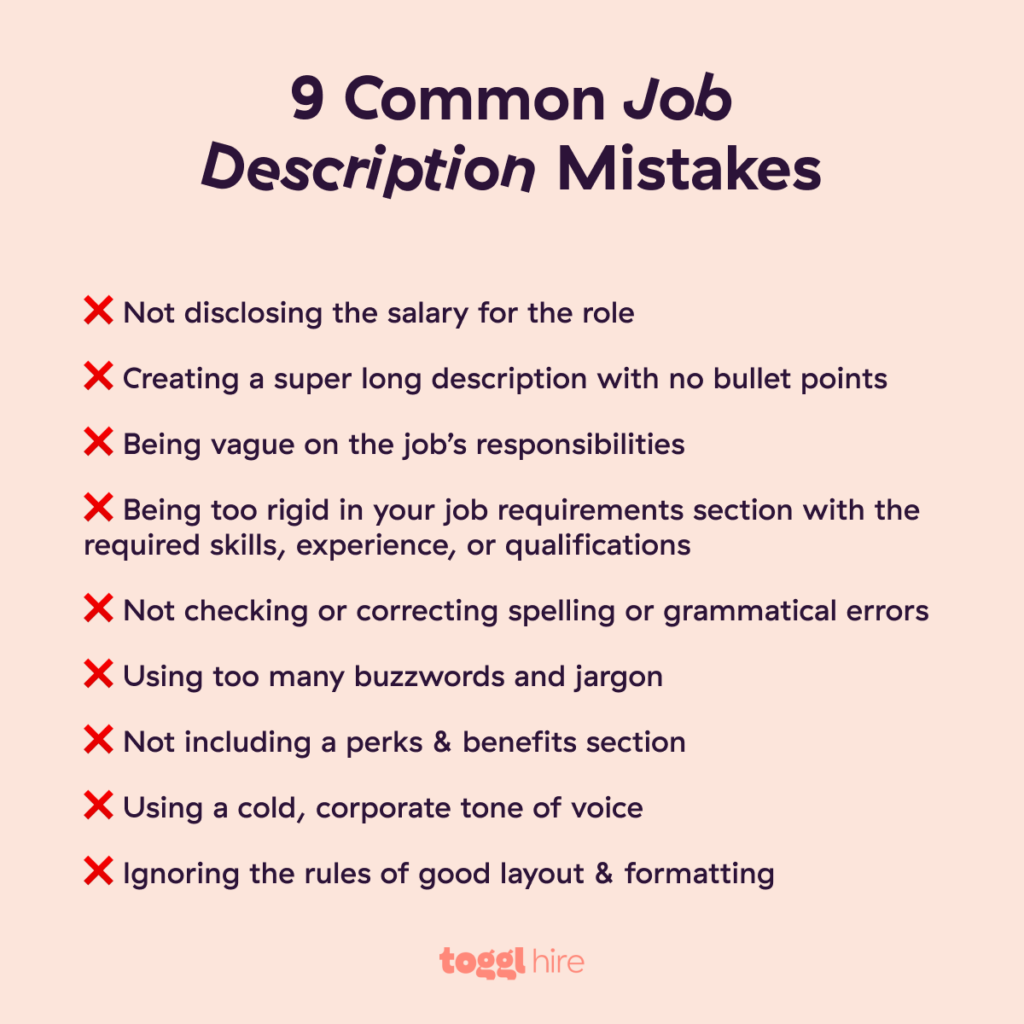
15 creative job description examples
These impactful and creative description examples from companies like OpenAI, Tesla, and Nike should help you get a feel for what candidates are actually looking for when scanning job boards these days.
1. Keep it simple
Go easy on the jargon, buzzwords, and meaningless words — they’ve got no place in your job titles and descriptions. If the language is straightforward, you’ll avoid causing candidates confusion or frustration. Ideally, do a check over your copy for these kinds of words and remove them.
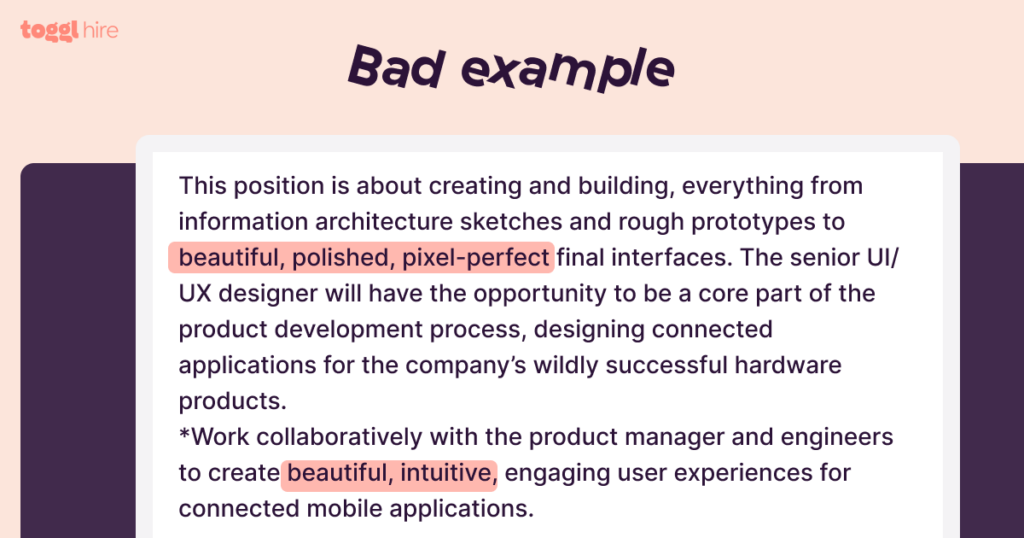
2. Keep it short
No essays or novels, please. Nobody is going to read all of that text. If you’re not using bullet points and writing very long descriptions instead, candidates will lose interest and close your job post. They’re probably browsing through stacks of other job boards and ads, so make sure yours is scannable!
Here’s a short and sweet job administrative assistant post that covers all the essential information.
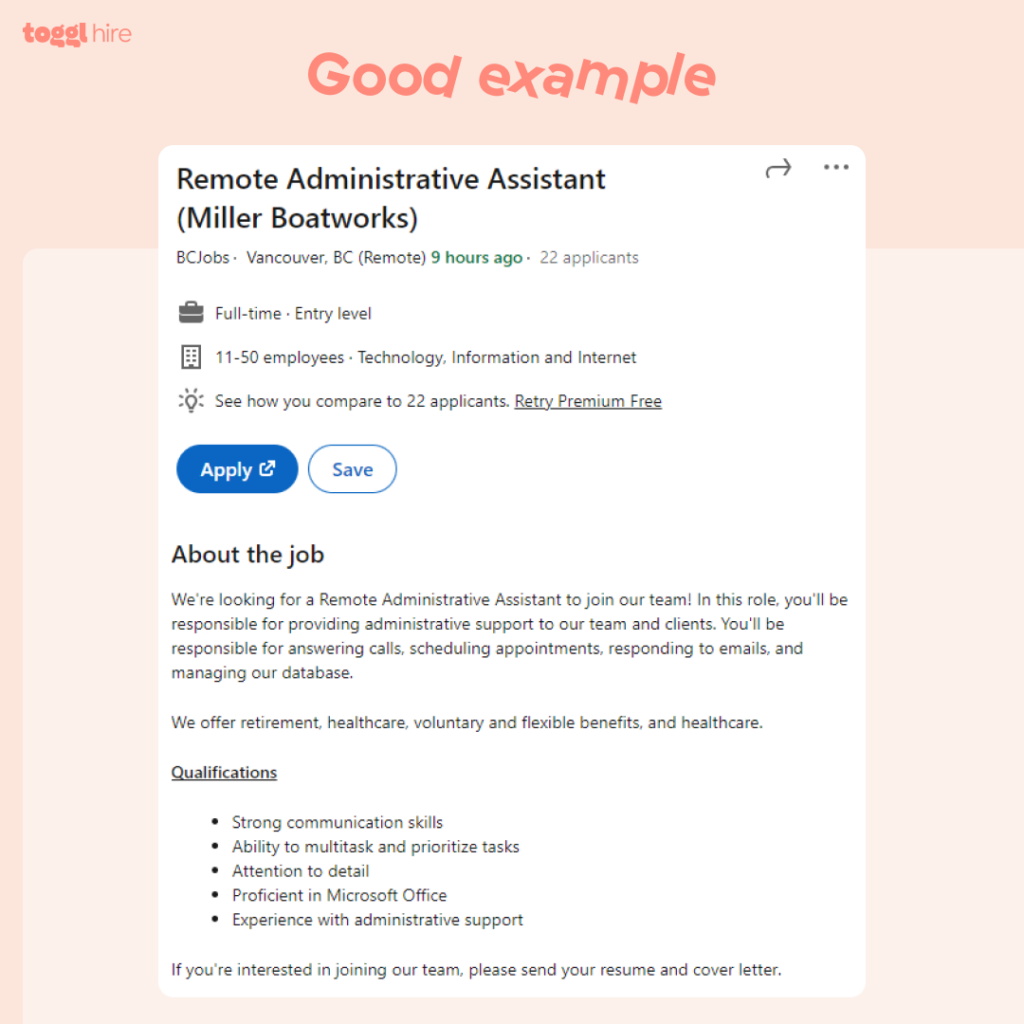
3. Get straight to the point
Don’t bury the lead — grab their attention in the first few sentences. That way, you can stop the ‘scroll’ and engage them so they read to the end of your job description and hopefully click Apply.
Here’s a great job description example by Canva for an experiential marketing manager position that grabs your attention from the get-go.
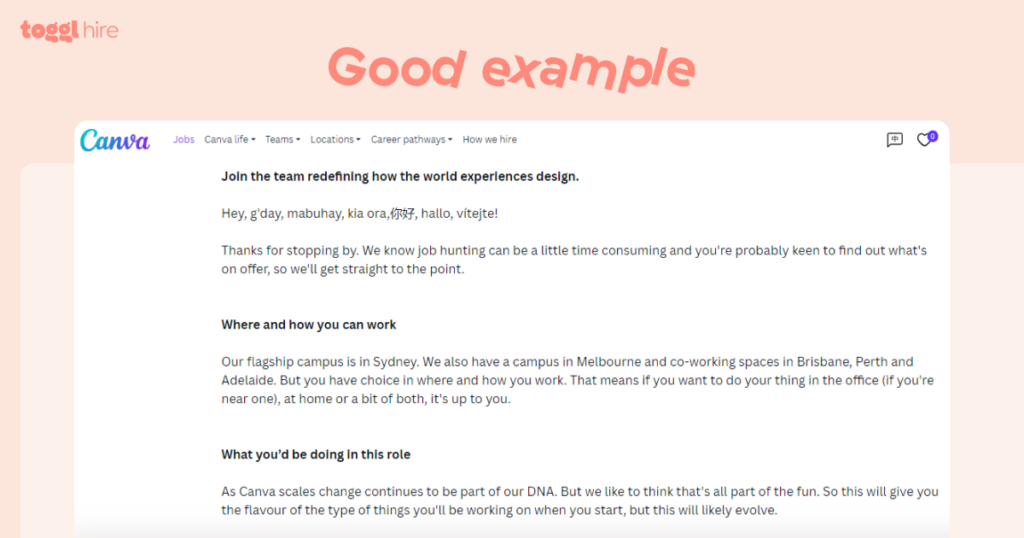
4. Speak to your candidates directly
Communicate in a direct and conversational way by using the word ‘you’ instead of ‘the preferred candidate.’ That way, you make the job description feel more personal, and the candidate feels more valued.
Take a look at this great example of using ‘you’ by DeepMind for an assistant to the VP of product management job posting.
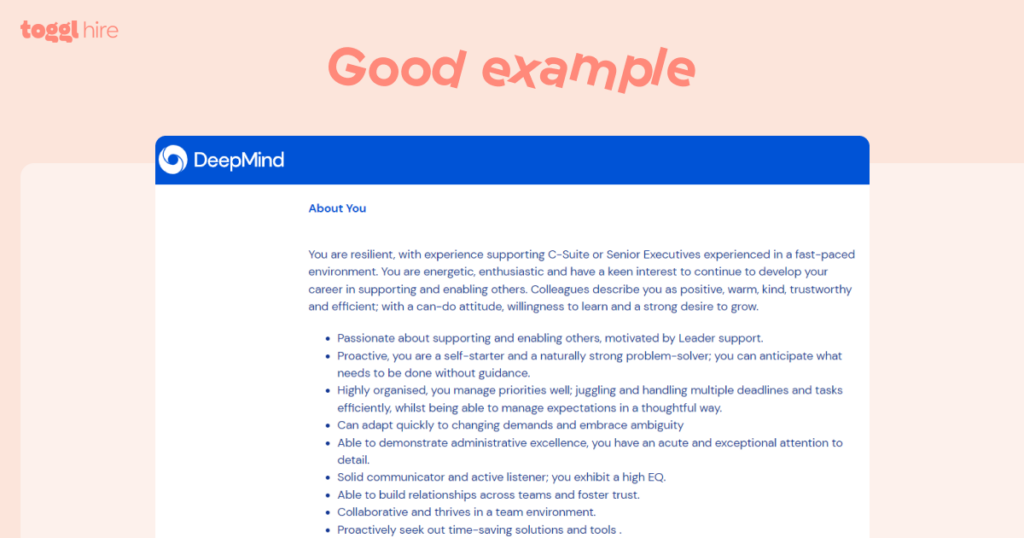
5. Share “internal” info about teams and projects
Offer some insight into the bigger picture. For instance, explain the goals of the team they’ll be joining and their current projects. For a technical role in particular, this could pique the interest of the right candidate and increase their likelihood of applying.
This OpenAI job description for a Full-Stack Developer, Communications & Design is a good example of what this looks like when done right, as it shares important details about the team and their goals.
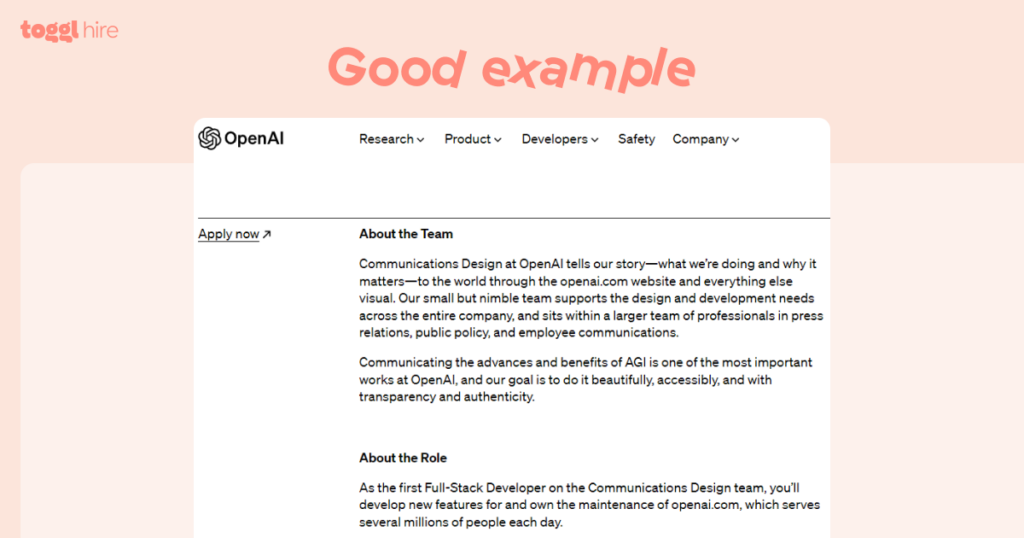
6. Share your purpose and company mission
Many of today’s job seekers are looking for a job with a purpose. Companies that communicate their vision, mission, or purpose in a clear, inspirational way in their job description connect with candidates’ aspirations. As a result, they will likely be around for a longer stint than those just in it for the paycheck.
Here’s a good example by Mastercard for a senior analyst position that shares their inspirational purpose. This could be slightly more scannable, but since it’s for a senior role, this length of text makes sense.
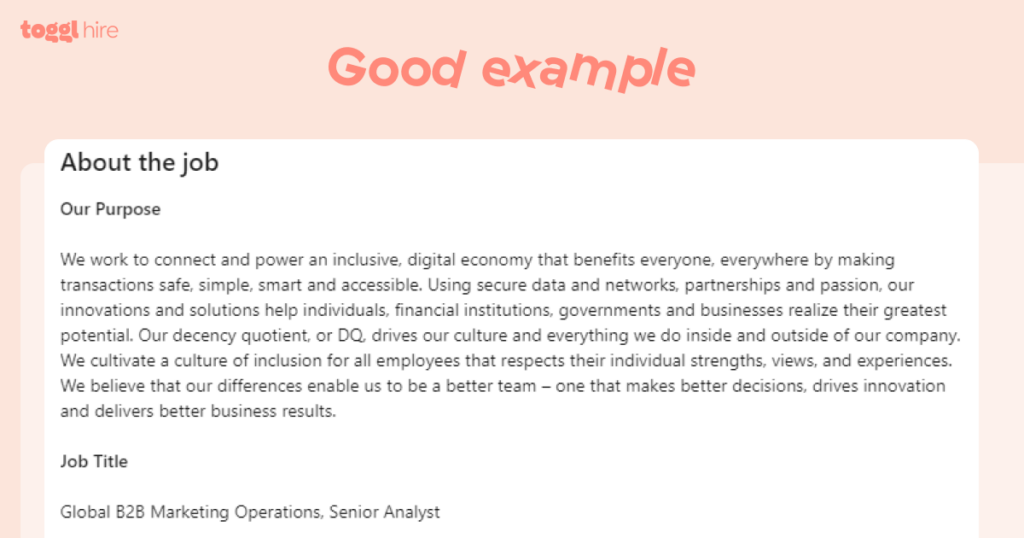
7. Provide clear expectations
If you let applicants know exactly what’ll be expected from them in the job requirements section of your job posting, you’ll avoid misaligned expectations and reduce the number of ‘chance takers’ hopefully, too! You could include specifics on the required education level, preferred qualifications, work experience, or any necessary accreditations.
In this great job description example from Tesla, they lay out the expectations clearly right at the beginning of the job posting.
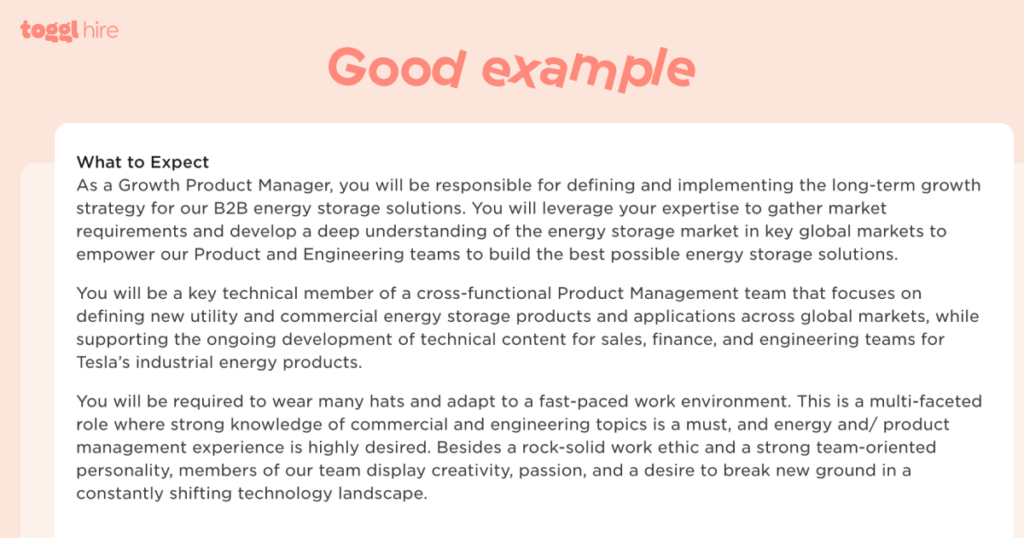
8. A user-friendly layout
Avoid chasing prospective applicants away with a job description layout, structure, or format that isn’t user-friendly. They shouldn’t have to scroll through endless text, struggle to find the Apply button or get lost in various embedded pages.
For this one, we’ll start off with an example of how not to do it with this Salesforce senior project lead job posting.
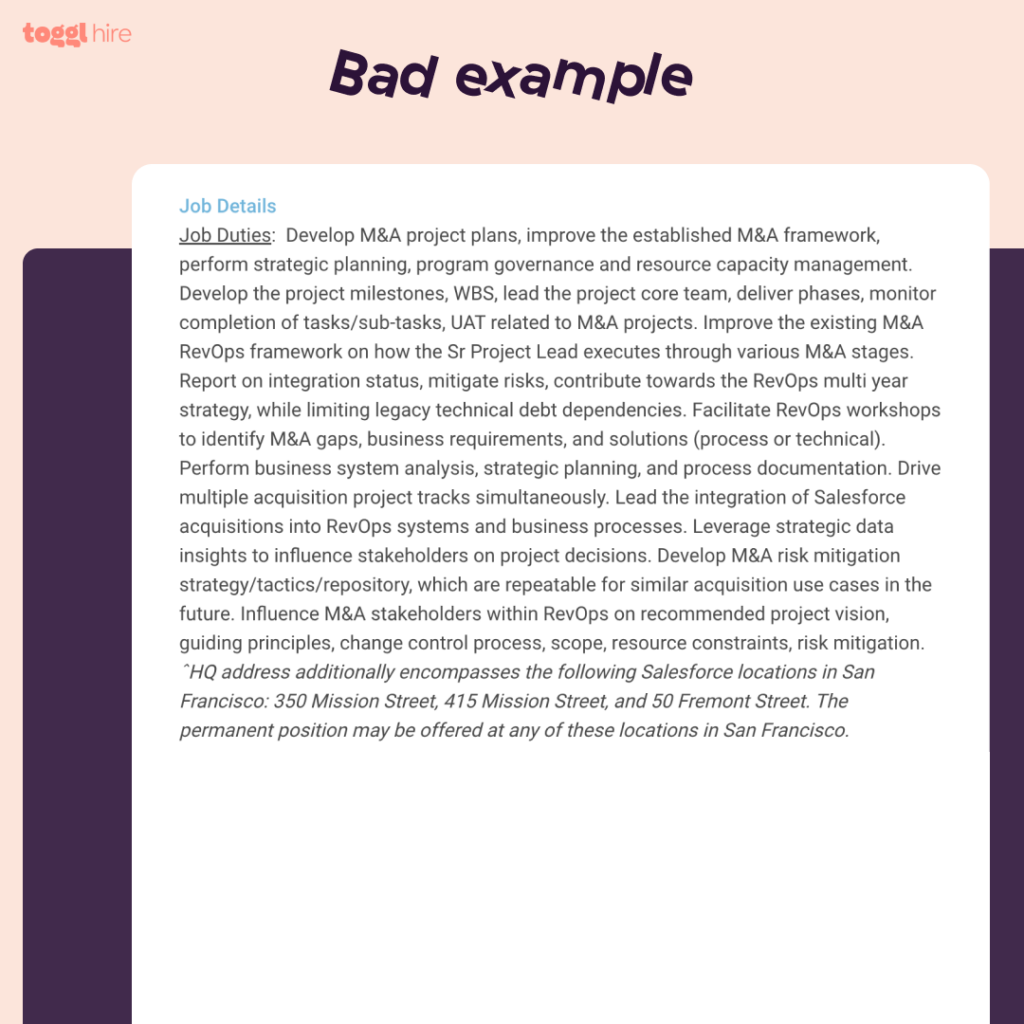
Now, here’s one on the other end of the scale that has a great UX layout, is scannable, and has clear ways to find out more and apply (Oh yes…it’s a Toggl post, naturally! 😉).
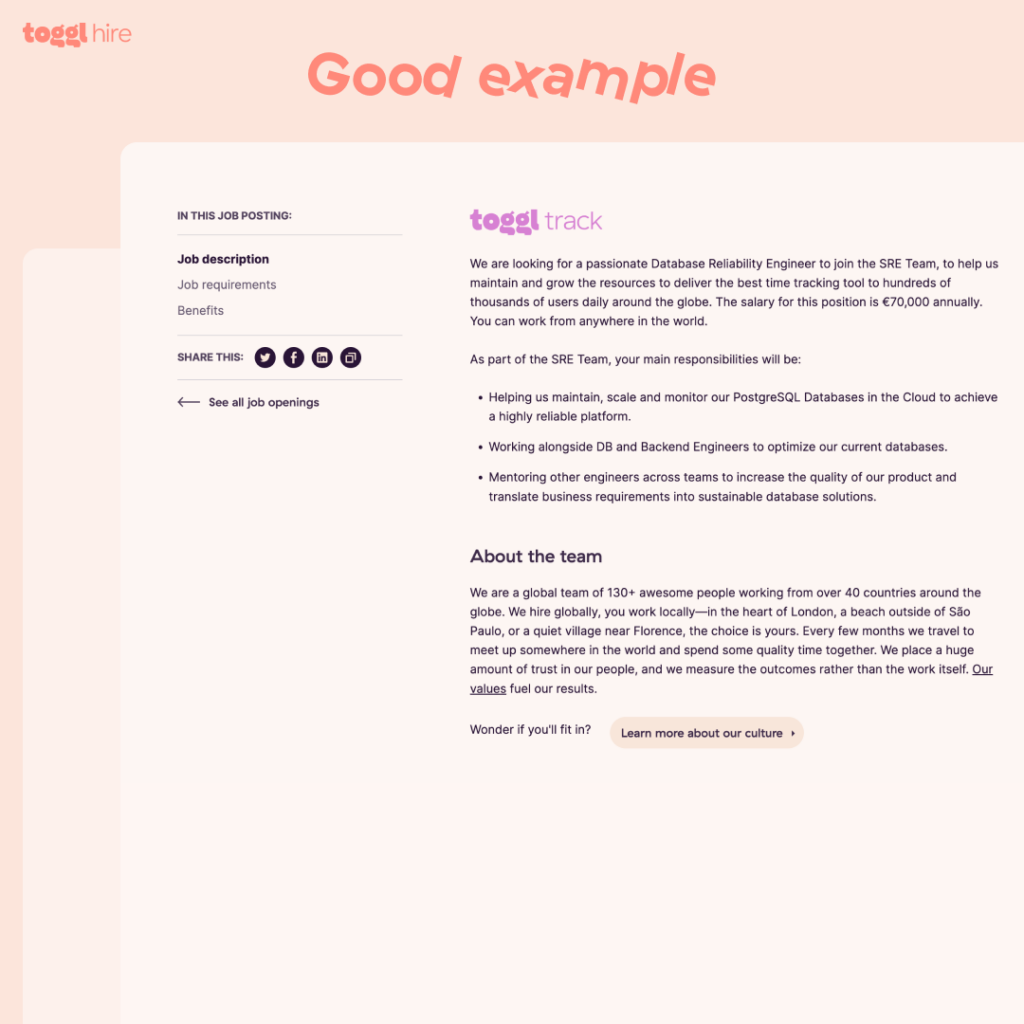
9. Tech-enabled convenience
Similar to ensuring a user-friendly experience for applicants, using the latest technology to simplify the application process can also help your job post conversions! Innovative companies include career chatbots, for instance, to collect basic applicant data answer simple questions about roles, and direct applicants to the next steps.
Take a look at this Mastercard ad for a customer success manager with their Career Bot ready to assist.
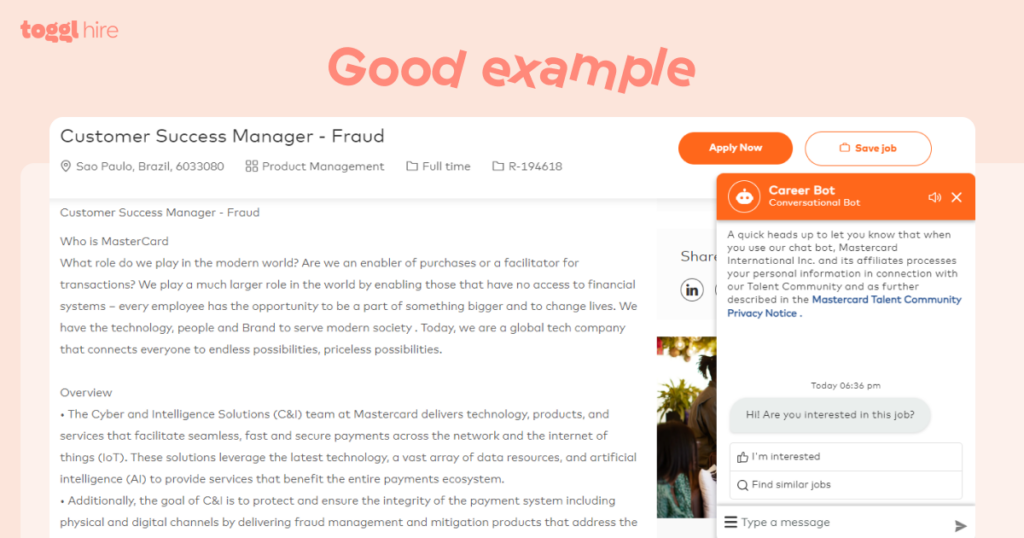
10. Convey your company culture
Great job descriptions give prospective employees a taste of the company culture. The more they understand what makes the company ‘tick’, the more likely they’ll be able to better assess whether they’re a fit for your organization or not.
Check out this job description example from Zapier for a senior product designer, where they demonstrate their caring culture in the ad copy. Love it!
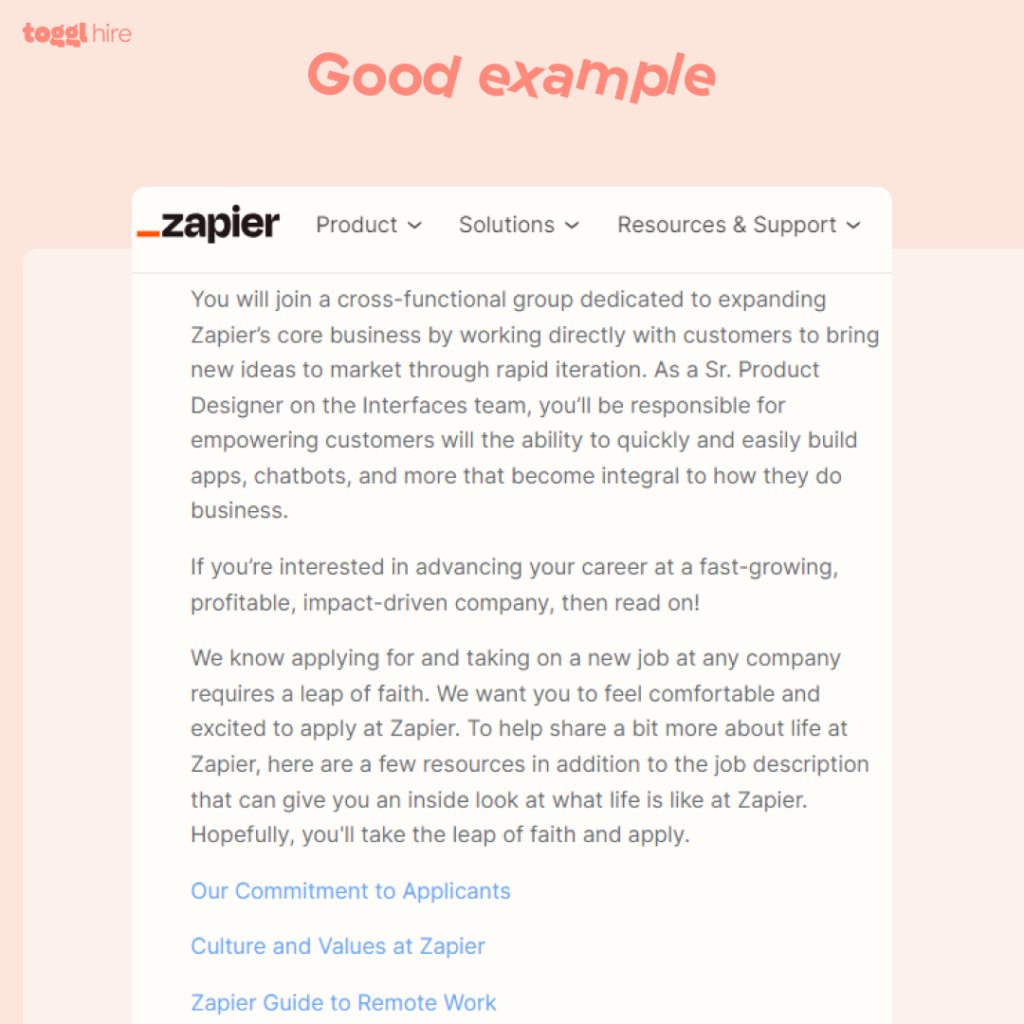
11. A glimpse into their day-to-day duties
Companies that paint a picture of the actual day-to-day duties of a role help applicants make a more informed choice on whether the job is a good match for them.
Take a look at how Nike explains the nitty-gritty of the job for this executive assistant role.
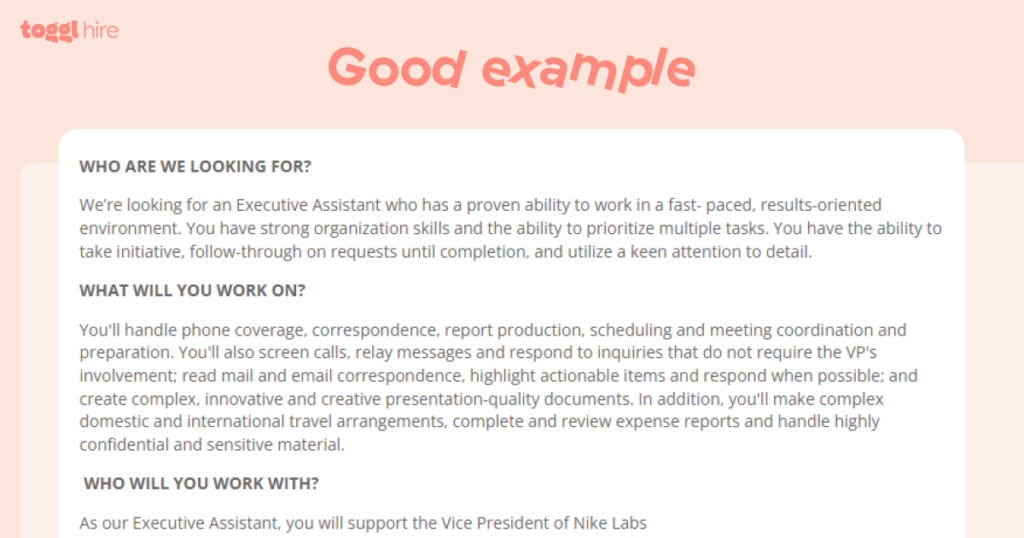
12. Salary and benefits
It’s important to spell out the salary and benefits for candidates. No matter the job title or level of seniority, candidates will always want to know ‘what’s in it for them’ when they learn more about a role and your business.
Sharing the benefits in a conversational way, as Roblox has with this Lead QA Engineer role, could help people already feel part of the team.
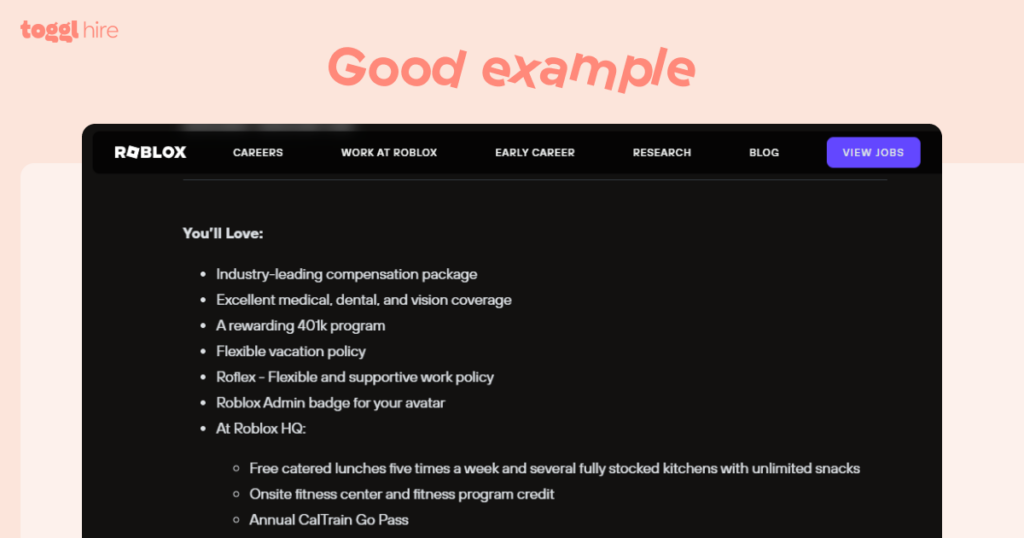
13. Stand out from the crowd
With people scanning multiple job posts in a few minutes, you need a way for your job posting to stand out. If not, it’ll surely get lost in the ‘scroll.’
Take a look at this receptionist job description posted by Hilton. They include their latest workplace awards at the top of the page — a real eye-catcher that immediately elevates their reputation as a desirable place to work.
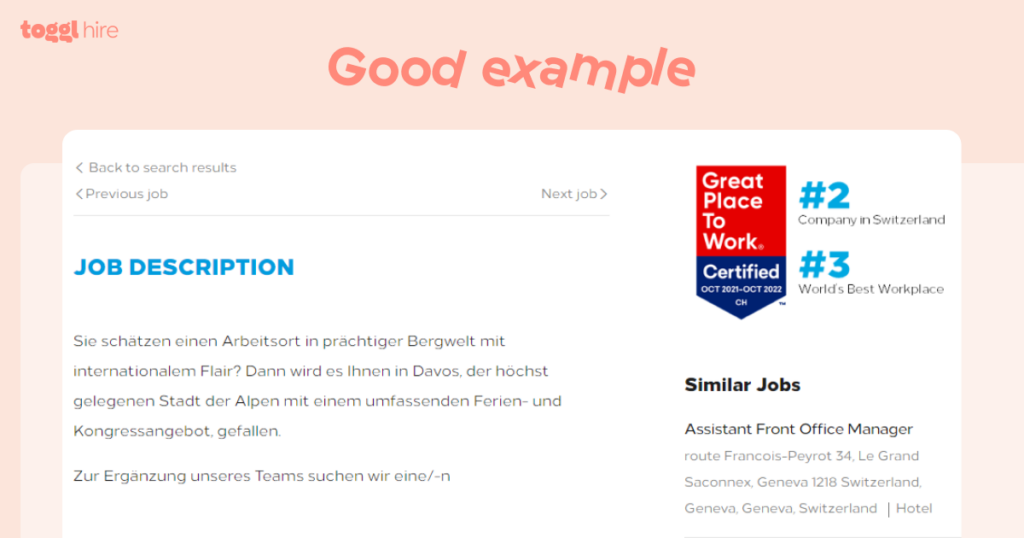
14. Respect local traditions and culture
Showing your company respects the local culture and traditions can also help you stand out as a good option for job seekers. Communicating these company values may also open up the recruiting funnel to more diverse and inclusive talent.
Take a look at Canva’s visual designer internship post based in Australia.
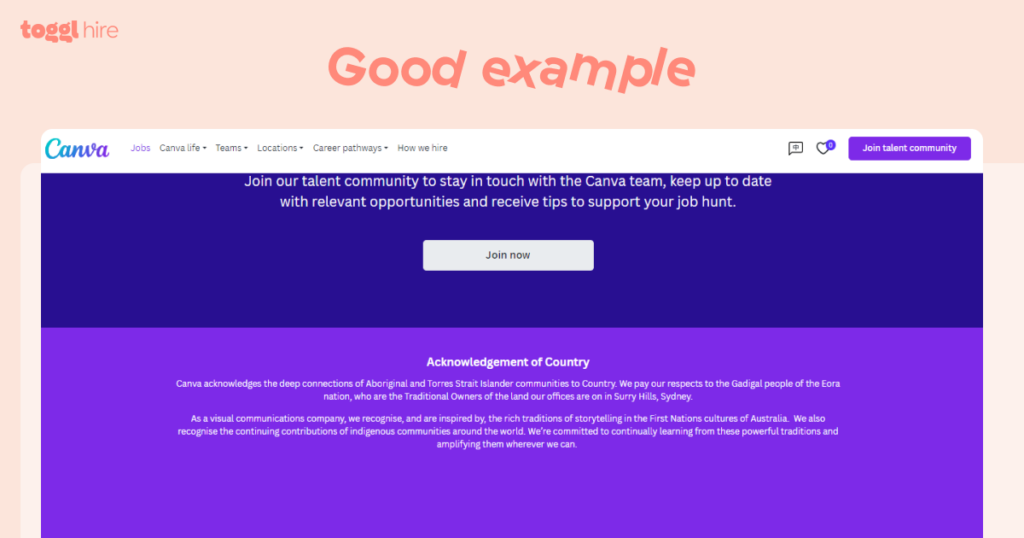
15. Include a call to action
Don’t forget the final touch, perhaps the most important part if you’re truly interested in enticing candidates to apply — the essential call to action or apply button! It needs to be clearly visible, people. If you’re going to send someone hunting for that button, you’re gonna lose them and possibly even harm your brand with the frustrating UX.
Take a look at Spotify’s clear ‘apply now’ button that remains visible the whole time you read through the job description.
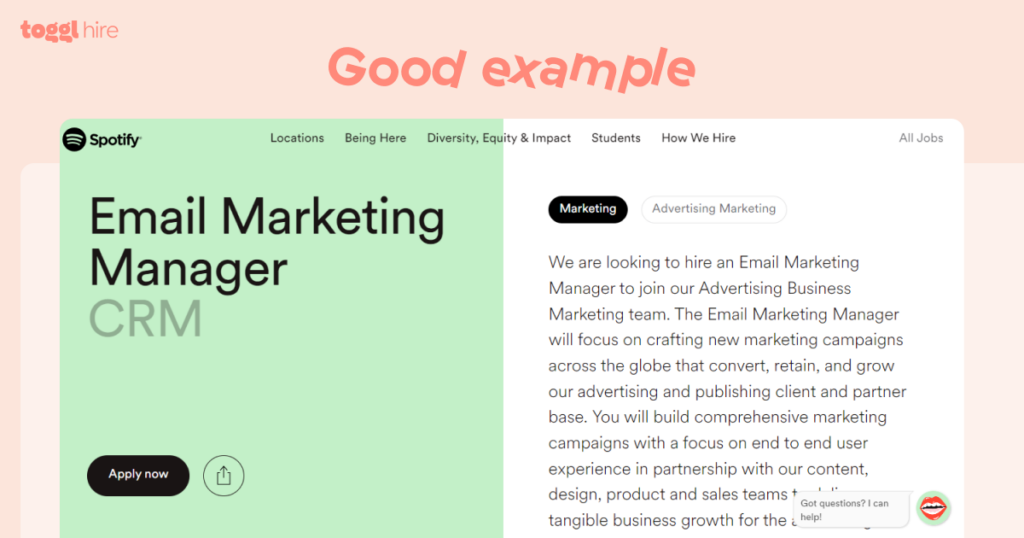
Bonus tip…
While the creative job description examples above show that these companies are thinking about candidates, here is an example that takes a candidate-centric approach to a new level.
The Canva careers page, in general, operates exactly like their product does. In other words, they’re living their product right from the start of their hiring process! A creative recruitment approach for a creative product is a brilliant way to stand out!
You’ll have to play around with their careers page yourself, as an image doesn’t do it justice!
Got ’em hooked? Now uncover the best with a skills test
A creative job description will help your role and company stand out in the sea of job opportunities. By thinking creatively and sharing what candidates want to know, you can stop the scroll.
And once you’ve attracted the right talent, you’re ready for the next stage — selecting the cream of the crop. Using an automated skills assessment platform will help you save time in the hiring process and establish who’s really got the skills required to succeed in the role.
Try Toggl Hire’s role-based skills tests today! Your free account awaits is just a click away.
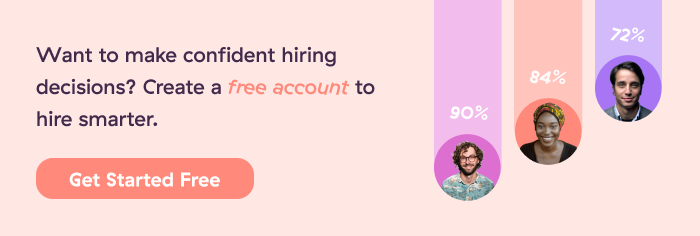
Juste loves investigating through writing. A copywriter by trade, she spent the last ten years in startups, telling stories and building marketing teams. She works at Toggl Hire and writes about how businesses can recruit really great people.




